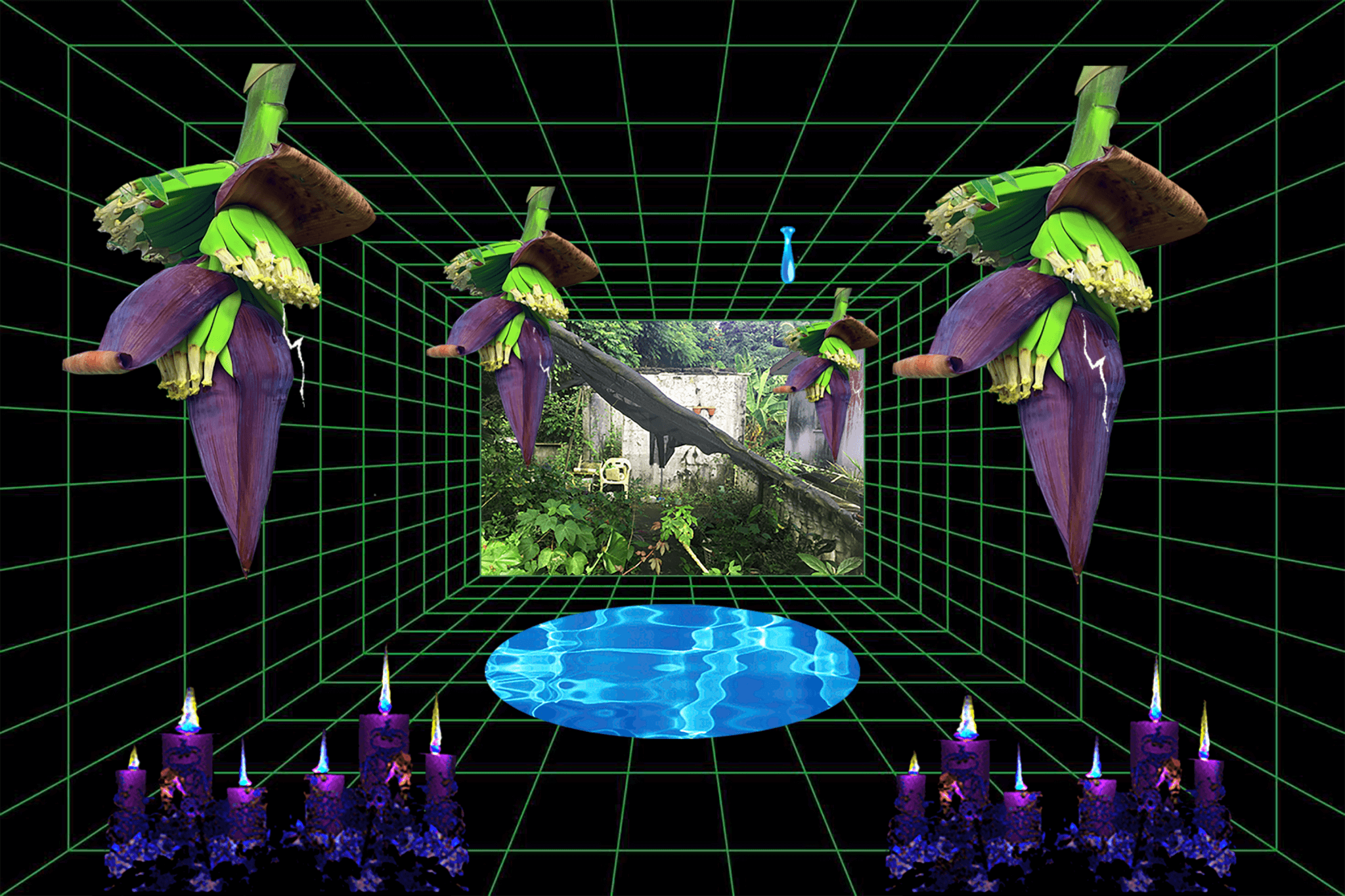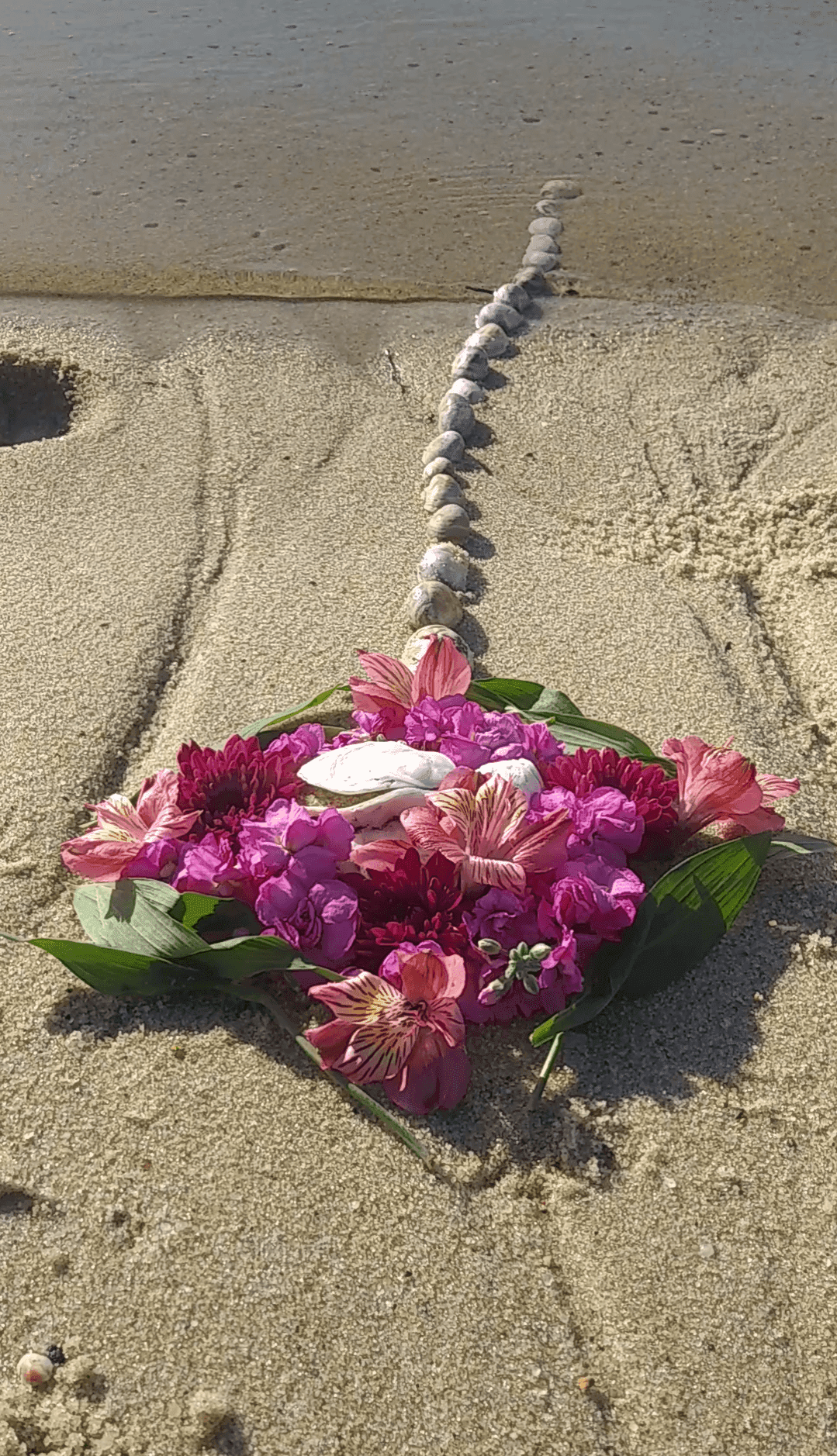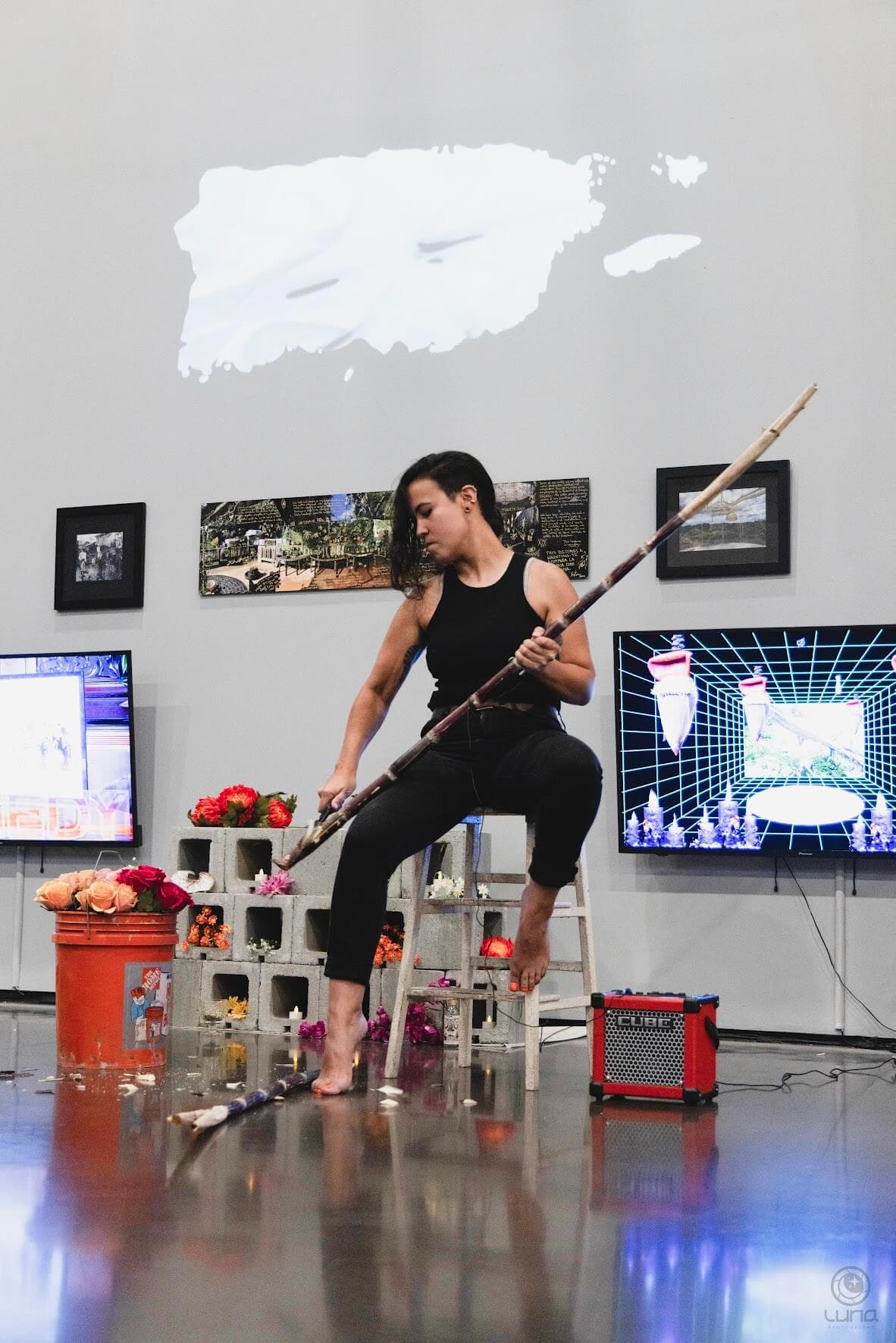“And with good food is the best way to talk about things! That’s how people have always done it,” Feda Eid remarks as we sit around the dining room table. It’s my pleasure to meet with artists Eid, Luana Morales, and Shey ‘Rí Acu’ Rivera Ríos at the beginning of their recuperative residency at the feminist artist residency space/nonprofit B&B Wedding Cake House in Providence, RI. They were invited to decompress and prepare for their collaborative exhibition, “Everything Living Fights Back,” which opened on May 31 at Aunty’s House.
In the two months since Providence College abruptly censored the installation of the show in Providence College Galleries (PCG), originally titled “Nothing Living Lives Alone,” I have found myself talking endlessly yet insufficiently about the reverberations of the cancellation. As the former editor of PCG’s online magazine Providence Arts & Letters, I saw the censorship effectively cease publication on an issue organized around the exhibition, featuring ten works commissioned by Providence-based artists and writers, including a media-rich multi-vocal text on performance art as healing work by Rivera Ríos. A major stumbling block in the long and winding process of finding momentum for the recently launched arts publication. Sitting with this community of artist-healers, it’s such a relief to be able to process pieces of what’s been unfolding in the Providence arts scene.
Interdisciplinary artist, community organizer, and cultural worker Rivera Ríos moved from Borikén (Puerto Rico) to Providence, situated on occupied Narragansett and Wampanoag land, over ten years ago. Their practice centers place-building and tending, both in the content of their artwork and in their years of work in the nonprofit sector, from art organizations to city planning committees. With its stated mission of cultivating connection with “neighbors near and far” from “diverse traditions,” an exhibition at Providence College Galleries, headed by new director Carol Stakenas, seemed an obvious fit. Stakenas, who assumed her role at PCG in September 2023, reached out to Rivera Ríos, and “Nothing Living Lives Alone” was scheduled to exhibit from March 27 to September 28, 2024. The title of the show comes from Margaret Wheatley’s writing, often quoted in adrienne maree brown’s brilliant treatise on/manual for radical self-care and community-care for organizing, Emergent Strategy. In a draft of their curatorial statement, Rivera Ríos wrote, “‘Nothing Living Lives Alone’ is an ancestral spell, a chant, that is anchored in the bodies and mouths of the artists and movement workers of today … It is a love letter to the Land of Borikén, Land of Taíno people and Black liberators, oldest colony of the United States of America.”

Still from Shey Rivera Ríos’s Platano Ancestor Room 1 (2023), originally intended to be included in “Nothing Living Lives Alone” at Providence College Galleries. Image courtesy of Shey ‘Rí Acu’ Rivera Ríos.
They describe their work as a liberation of queer Boricua futurity. It is rife with imagery simultaneously nostalgic and futuristic. They open portals that travel both back and forward in time, with GIFs of electrified platanos and flickering altar candles, or landscapes illuminated with golden annotations, but their practice has always been about community building. Since 2014, they have curated and produced LUNA LOBA, “a performance series that creates space to explore ritual through artistic practice.” In conceptualizing the show for PCG, Rivera Ríos immediately knew who would be their guest artists and collaborators: Feda Eid and Luana Morales. “Each of the three artists have their own experience of diaspora, with a visceral and spiritual understanding of the impacts of uprooting—from land and family—and rooting again to build home and kinship in new ways.”

Guests in front of Feda Eid’s photographs and sculptural works. Photographs from left to right: Diaspora, 2019, Picnic, 2022, Homemade, 2019. Sculpture at center: For Habibis Eyes, 2024. Photo courtesy of the artists.
Eid is a Lebanese American artist whose parents fled Lebanon in 1982 during the persistent violence at the shifting borders between Israel and Lebanon that displaced over one million people. Eid’s vibrant and sensually rich photography explores connections to heritage, culture, identity, and tradition through self-portraits, performances, and installations that rely on striking visual and thematic juxtapositions. Morales is a birth and death doula and cultural worker whose healing practice is rooted in the Afro-Indigenous lineages of Borikén. The energetic connection between the three feels potent: Morales and Rivera Ríos met at a ceremony for moving through grief and rallying aid in the wake of Hurricane Maria in 2017; Rivera Ríos met Eid at the Assets for Artists residency at MASS MoCA in 2022; and Eid and Morales met as “luminaries-in-residence” at the Isabella Stewart Gardner Museum in Boston. All three artists engage video, performance, and ritual as avenues of working with the legacies of diasporic trauma. As we introduce ourselves and each other at the Wedding Cake House, their mutual admiration and respect is not simply a joy to witness—“The moment I heard her voice I knew it was magic!” “The moment I saw her dragging this whole tree down the road I had to know her!”—it’s tactically generative. In an art world so often governed by the narrowing forces of critique and scarcity, in the words of adrienne maree brown, “why not follow the wow?”
But just two weeks in advance of the show’s opening, Providence College’s Senior Vice President of Academic Affairs and Provost Sean Reid notified Stakenas that the exhibition could not proceed due to the discovery of imagery that was deemed “hurtful and offensive to many of the Catholic faith” in an artwork belonging to Rivera Ríos. Providence College is a private Catholic institution which operates under the Dominican Order in Rhode Island.
The piece in question was Prayers to Nana Buruku altar, originally produced for the 2017 exhibition “FANTASY ISLAND.” The work is part of a series of annotated images from art history textbooks that explore the relationship between canonical religious artworks and the Afro-Indigenous reconceptualizations of Catholic symbols, iconographies, and identities: emergent tactics for cultural survival in colonization. Nana Buruku was never intended to be included in the PCG exhibition; it was simply posted on the artist’s personal Instagram page. Someone went digging, it would seem.
From an email to faculty dated March 20, 2024, Provost Sean Reid expressed concern that the artist “could reasonably be understood to be expressing contempt for [the Catholic] faith.” (1) Such an interpretation flattens the work’s examination of Catholic hybridities unique to Caribbean cultures. Crucially, Reid claimed that the exhibition organizers did not receive approval from their divisional leader as outlined in the college’s “outside speaker policy” from 2015. Faculty from within the college purport that Provost Sean Reid received direction and/or pressure from the Office of Ministry & Mission to investigate and eventually cancel the exhibition.

Shey ‘Rí Acu’ Rivera Ríos, Prayers to Nana Buruku, mixed-media installation, 2017. Installation view, “Everything Living Fights Back,” Aunty’s House, 2024. Photo courtesy of the artists.
Providence College faculty and students responded to the cancellation with shock and dismay, holding an “un-opening” on March 27 in place of the scheduled show and penning multiple internal and public letters of protest against Provost Sean Reid. The frustrations from staff were magnified by recent acts targeting LGBTQIA+ individuals at the college. Just a week prior, The Providence Journal reported that over 500 individuals had signed a letter outlining the college’s systematic repression and oppression toward the queer community. On April 4, art history professor Paul Crenshaw wrote a letter to faculty outlining where the administration had overstepped and/or violated the outside speaker policy. And on April 22, the college announced that Sean Reid had resigned from his position.
Reporters at Hyperallergic and MotifRI have detailed the timeline of events leading up to and following the censorship. Outcry from the Providence art community over the censorship quickly circulated along with a GoFundMe campaign to generate funds for a new iteration of “Nothing Living Lives Alone” under the new name “Everything Living Fights Back.” Feminist artist-run organization Dirt Palace and nonprofit community art space AS220 both put out formal statements of solidarity with the artists and announced they would be ending their partnerships with Providence College Galleries.
We at Providence Arts & Letters (which is to say I as editor and all participating artists and writers, with the support of director Stakenas) collectively decided not to publish our work in support of Rivera Ríos, Eid, and Morales.

Artists Feda Eid, Shey ‘Rí Acu’ Rivera Ríos, and Luana Morales at the opening of “Everything Living Fights Back” at Aunty’s House on May 31, 2024. Photo courtesy of the artists.
The works in “Nothing Living Lives Alone” were conceived as portals to and ritual offerings of mutual liberation from people of diasporic lineages. The censorship is yet another iteration of colonialism’s persistent suppression of “diverse traditions.” As we witness increasingly restrictive legislation of curricula in primary and higher education, farcical congressional hearings of university presidents, and violent action against student protests demanding university divestment from the financial support of unprecedented and brutal military action against Palestinians, variations on this theme are playing out on a national scale. Perhaps the Office of Mission & Ministry thought the cancellation of a video installation show in the Galleries wouldn’t make waves, but nothing living lives alone.
In true synchronicity, the energetic response of Providence’s art community and the exhibition’s refashioning and installation of “Everything Living Fights Back” is nothing less than an emergent strategy. This kind of response is not born of bureaucratic process or institutional permission, but the connective tissues that grow from building community with presence, care, and love, and as Rivera Ríos emphasizes, “showing up for the community for years.” adrienne maree brown writes that activist and teacher Grace Lee Boggs “often said that every crisis is an opportunity, which is amazing theoretically, and requires great emotional fortitude in practice…” When I asked how they are feeling in the liminal time after the censorship, before the re-emergence, Rivera Ríos said, “The energy is fire!” Morales similarly remarked that perhaps the exhibition had to close so that it could find a more generous home for expression, so that we could show up “in our full, juicy, three-dimensional, relational way.” Performance art and healing both require presence; how can we keep settling for anything less?
“Everything Living Fights Back” is currently on view in Aunty’s House, a community art space founded by artist and educator Lilly Manycolors that centers artist parents and families. In this space, the artists’ work takes on a different tone than it might have in the Smith Center for the Arts at Providence College. The exhibition features video, installation, photography, and mixed-media works that all feel like invitations.

Luana Morales, Return to the Womb of my Mother, video still, 2024. Courtesy of the artist.

Shey ‘Rí Acu’ Rivera Ríos during a performance at Providence Biennial, 2023 Photo by Jenny Luna Watson. Courtesy of the artist.
Morales’s transporting video of a ritual return to the ocean in Back to the Womb of the Mother plays next to a shelter lovingly adorned with petals and shells: come, rest, return. Eid’s photographs of diaspora and ritual are stunning—I am transfixed by the color, clarity, and thematic contrasts of her work. Her video Rooted Revelations offers sensory gifts: sun catchers intercut with rolled grape leaves and crystal bells, to be enjoyed while seated on satin-cushioned milk crates. Prayers to Nana Buruku altar holds court—she insists on presence in the face of suppression.
Rivera Ríos also offers an embodied opportunity to “Fight Back”: an Everlast heavy bag labeled COLONIALISMO hangs alongside a black and white Borikén flag and bright red boxing gloves. We are invited home at Aunty’s House, in both easeful and stirring ways, to appreciate—Eid writes about her work—“[objects, rituals, and sensory practices that are all] portals for passing on ancestral or intuitive knowledge….reminders that we may access Home anywhere we are.”
The opening reception on May 31 quickly reached capacity—the room was filled with members from across the region’s arts community. The artists are planning a performance and closing reception on June 15.
The artists continue in residency at the Wedding Cake House through mid-June for repair and healing after the last two months, feeling into “that generative shit.” And this is where we meet. Part of why I love working as and with an editor is because it highlights the collaborative nature of writing as making. So often we see it as a solitary creative act, but I find it’s best when it unfolds as a conversation: iterative, evolving, blossoming. So, while the work of Providence Arts & Letters’ silent issue has yet to find its next avenue of expression, I’m grateful to have had this opportunity to reflect on the censorship, regrouping, and reemergence of what’s living in the wake of all of this. Finally, after all this grief I am so moved by the idea that in the Providence art scene, this is what “Fighting Back” can look like. It looks like acts of solidarity, gestures of generosity, insistence on accountability, and perhaps most of all, sharing nourishment together.
Endnotes:
1. From an email to faculty dated March 20, 2024, the full paragraph reads: “While the artist is accomplished and has a broad portfolio of work, one of the artist’s pieces is a manipulated image of Jesus and the Virgin Mary. After speaking with several members of the PC community, I was able to better understand the context of the artist’s work. At the same time, that particular image, while not scheduled to be a part of the months-long PCG exhibit, is hurtful and offensive to many of the Catholic faith, including those who find it sacrilegious. Ultimately, in my judgment, the college has the right and obligation not to sponsor and house the work of an artist at PCG who could reasonably be understood to be expressing contempt for that faith and its sacred imagery.”
2. In a passionate (and thorough) email to faculty from art history professor Paul Crenshaw dated April 4, 2024, detailing the many nuances of the exhibition and the “offensive” work in question, he includes background on the Policy:
“Let us be clear: President Fr. Kenneth Sicard, Provost Sean Reid, and interim VP for Mission and Ministry Bob Pfunder have egregiously and knowingly violated the terms, process, and intent of the Outside Speaker Policy of the College. This policy was developed by the faculty senate and approved by the administration in 2015, following the abrupt cancellation of a planned lecture by John Corvino, a scholar on philosophical and legal issues of same-sex marriage. This cancellation brought national embarrassment to the College. The Outside Speaker Policy was developed specifically to remove the administration’s power to unilaterally cancel an event. Yet they have claimed the right to do so in this case. They have no such authority.
The Outside Speaker Policy expressly allows for a review of only the content to be presented, not any other work or activity by a speaker, presenter, or artist. That point was carefully deliberated by the committee that developed the policy, because review of any other work or activity of an outside speaker presents a slippery slope of what may be deemed ‘unacceptable.’ The policy has no provision for cancellation of an event. Instead, it offers a process to request modification of format and dialogue, though only if the specific content of the presentation advocates the rejection of a Church teaching or doctrine and only in consultation with the appointed Speaker Advisory Group. That is simply not the case here.”
“Everything Living Fights Back” is on view through June 16 at Aunty’s House, 25 Acorn St., #35, Providence, RI.







